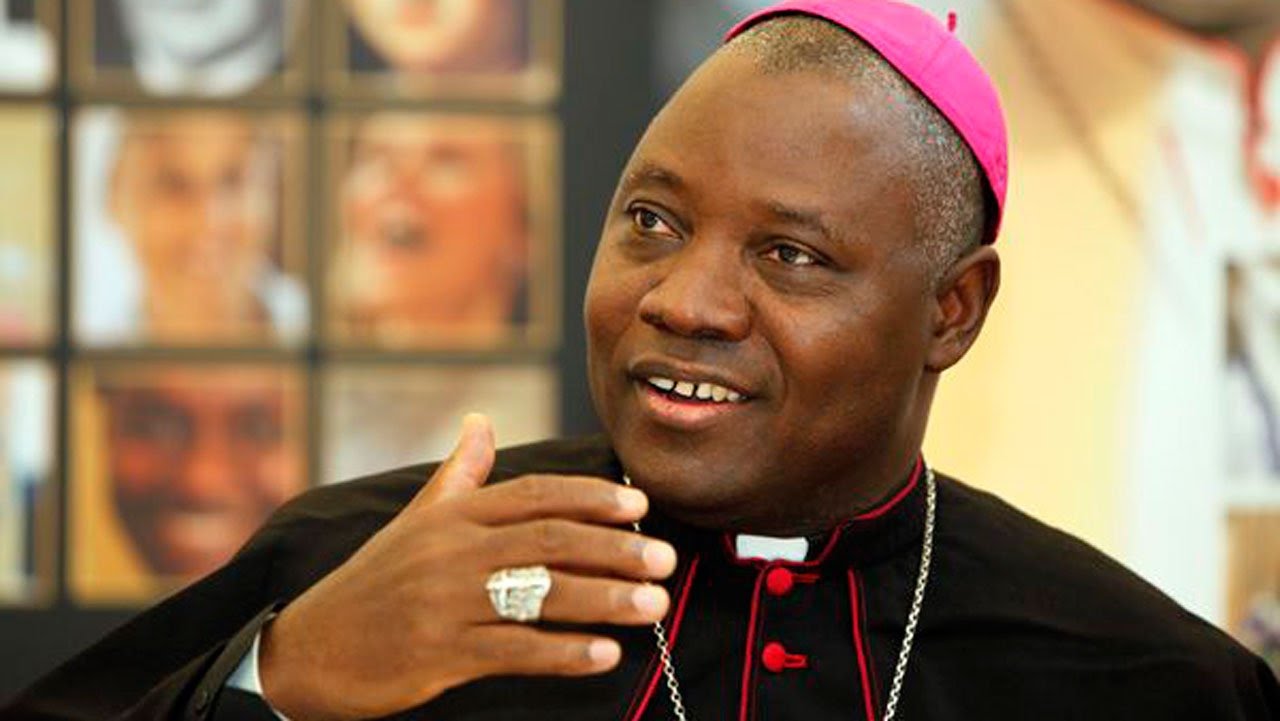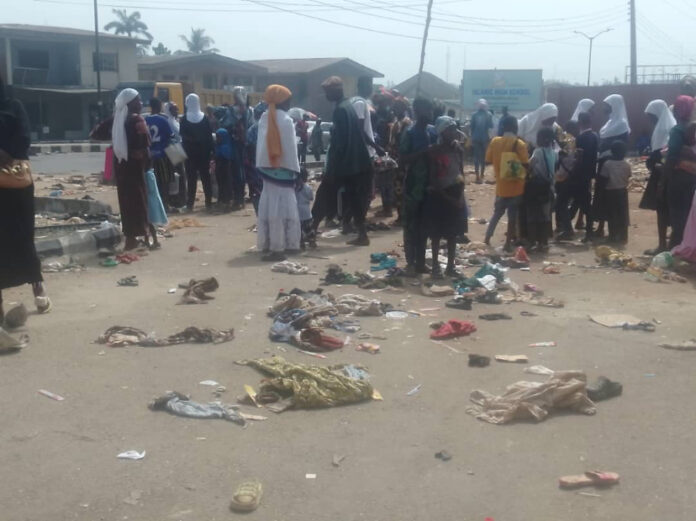Businessman-cum-politician, Prince Ned Nwoko of Idumuje-Ugboko community in Aniocha North Local Government Area of Delta State, who reliable sources say has continued to pull the strings of false stories, has alleged that another prominent son of the community who is the chairman of Rainoil, Chief Gabriel Ogbechie, is sponsoring a plot to assassinate him.
This, however, was found not to be true.
According to a petition he wrote to the office of the Commissioner of Police, Abuja, Ogbechie was mentioned as a sponsor of the plan to kill him by two suspects in Kuje Prison. He alleged in the petition that his wife, Regina Daniels, was told by one Wale Jana that he (Jana) was informed about the plot by an inmate who overheard the suspects discussing how to assassinate him.
Part of Ned’s petition reads:
_“I was reliably informed by my wife, Regina Daniels, who was also informed by one Mr. Wale Jana, that the suspects who were arrested and remanded at the Kuje Correctional Centre in connection with the murder case in my village, are plotting to cause me harm and possibly kill me._
_From the information made available to me, the evil plot is being sponsored by one Chief Gabriel Ogbechie, the chairman of Rainoil. I came to this conclusion because, according to the report sent to my wife by Wale Jana, an inmate in the same room with the suspects at the correctional facility who pretended to be sleeping heard them plotting to harm me by conspiring with others outside the prison yard. From what he heard, the sponsor of the planned attack owns a filling station and is in the business of oil and gas and hails from the community around. As far as I know, the only person that fits that description is one Chief Gabriel Ogbechie…”_
Meanwhile, if it were not for the involvement of the police, the nakedness of Ned Nwoko’s false assassination theory would have gained public acceptance.
Based on Ned’s petition, Chief Gabriel Ogbechie and other people were reportedly invited by the police for questioning, including Ogbechie’s lawyer. The case got to the office of the Inspector-General of Police who then put together an investigative team to probe the allegation.
In the course of the investigation, Ned was asked to present the said Wale Jana who he said in his petition overheard the suspects plotting to kill him, but Ned changed the story.
He was said to have told the police that the person who actually heard the suspects planning to kill him was not Jana but one Ossy Boise. When he was asked to present the Boise, Ned said the guy was dead. Then the police reportedly asked him to tell them how the Boise died, where he died, what killed him, and where the autopsy report is, to which Ned could not make available any proof. Consequently, the case was dismissed by the police.
It was after his plot hit the rocks that, we gathered, Ned Nwoko decided on an escapee method by pushing the story to the public domain. In his public narrative, Ned claimed that the Boise that died was actually poisoned and that Gabriel Ogbechie was behind his killing so that Boise wouldn’t be able to testify against him (Ogbechie) in the case.
Logically, Ned Nwoko’s narratives were clear falsehoods, based on two premises. The first premise is that, in the petition that he wrote alleging a plot to kill him, Ned mentioned one, Mr. Wale Jana, as the person who informed his wife someone overheard the suspects discussing the plot. When Ned was asked to present the Wale Jana, he changed the story.
Ned said that it was not Jana but one Boise. The second premise is that, when the two community youths were arrested, they were arrested and detained for murder. When they were taken to court, the judge said that they should be remanded in Kuje Correctional Centre pending the conclusion of the investigation.
But Kuje Correctional Centre was overcrowded and because of the coronavirus protocols, the two suspects were remanded at Suleja Correctional Centre. In other words, Ned was not aware that the suspects he claimed were overheard plotting his assassination in Kuje Correctional Centre were indeed being detained in Suleja Correctional Centre.
Therefore, sources said, it is clear as crystal that it was a false narrative that Ned pushed to the public place and these revelations have verified the fact that, indeed, there was no plan by anyone to kill Ned Nwoko; it is just a plot to malign Chief Gabriel Ogbechie.
Sources also confirmed that the assassination theory, including ceaseless media attacks, is actually part of face-saving efforts to get back at Chief Gabriel Ogbechie, who he perceives as supporting those he (Ned) is being oppressed in a community land tussle that dates back to twenty years.
According to insiders, Ogbechie has been challenging Ned, in a courteous manner, on his violation of the due process required to acquire a community land, asking of him to engage the leadership of the community properly in doing so. The land crisis involves Idumuje-Ugboko community from where both Ned and Ogbechie hail and all Chief Ogbechie has been doing is to bring peace back to Idumuje-Ugboko community and to compel Ned Nwoko to protect and preserve the throne and the family heritage and not drag the throne and, indeed, the Idumuje-Ugboko community to disrepute.
The problem began in the Year 2000.
Ned Nwoko had approached the late King of Idumuje-Ugboko, HRH Obi Albert Nwoko that he wanted to be allocated 33 hectares of land because he was bringing investors to the community to build a Cattle Ranch and Dairy Farm where the youths of the community would be employed.
The late king excitedly allocated the 33 hectares of land to Ned as requested, for free, we learnt. However, instead of fulfilling his promise to bring investors to Idumuje-Ugboko, Ned only erected his personal mansion on a portion of the land and held on to the remaining part without any development.
Few years after that, Ned again approached the late king to request for another 100 hectares of land upon which he promised to build a sports university, the first of its kind in sub-Sahara Africa.
But the king refused him, on the ground that the 33 hectares of land he was earlier given which he has failed to put to use for development as promised, was still causing the crisis in the community.
The king then asked him to first start the sports university on the remaining portion of 33 acres and more lands would be added if that was not enough for the university project. Sources said that Ned was not comfortable with the king’s suggestion. Hence, he reportedly kept the pressure on the king on the matter and in the process, the king died on the 9th of February 2017.
The Idumuje-Ugboko’s kingship is hereditary; so, it is expected that when a king dies, one of his children would naturally take the throne. In that regard, the late king’s first son, Prince Chukwunomso Nwoko, was chosen to succeed his father and the necessary rites to that effect were undertaken.
According to sources, Ned Nwoko soon approached the Prince and told him that his late father had already promised him a hundred hectares of land for the university project.
But the Prince reportedly replied Ned that he was privy to the agreement he had with his late father, which was for him to first start the university project on the remaining part of the 33 hectares earlier allotted to him. The Prince told him that until he started the project on the first land, the palace could not give him another land. Ned didn’t like that, sources said, thus, he reportedly began working against the Prince’s candidacy to the throne.
According to reliable sources, Ned got in touch with people relevant to events that would make the Prince get his staff of office, applying pressures on them, and eventually the Prince has not received the staff of office till date. A meeting was reportedly called by elders of the community to deliberate on the next line of action but, according to information, thugs suspected to be working for Ned Nwoko invaded the meeting place and disrupted the process. The meeting was then relocated to the palace. Again, we gathered, thugs stormed the palace, but the youths of the community rose to defend the palace and stop the thugs. Tension arose and it degenerated to a free-for-all.
Following the palace scuffle, we learned, Ned Nwoko wrote a petition to the police headquarters in Abuja that somebody, a certain Okada rider from Onicha-Ugbo, was killed in the palace and the community youths are held for murder.
Subsequently, two of the community youths were reportedly arrested. In the course of the investigation, nobody was found to have died in the palace encounter. But based on Ned’s petition to the police, the arrested youths were taken to court and remanded in Kuje Correctional Centre pending the conclusion of the investigation.
A few days after, and before the final funeral rites for HRH Albert Nwoko, Ned wrote another petition to the police against the Prince and president-general of the Idumuje-Ugboko Development Union (UDU), Mr. Okey Ifejiokwu. Both the Prince and the community union president were arrested.
That was when prominent personalities in the community decided to intervene. The pressure was, however, mounted on Ned by Ogbechie and elders of the community and the Prince was released, leaving Ifejiokwu in the police net.
The Rainoil chairman later got a lawyer for Ifejiokwu through whom he secured his release from custody. That was where the problem between Ned and Ogbechie actually started. Ned had assumed that Ogbechie was supporting people against him. Hence, the assassination plots.


 BIG STORY2 days ago
BIG STORY2 days ago
 BIG STORY2 days ago
BIG STORY2 days ago
 BIG STORY3 days ago
BIG STORY3 days ago
 BIG STORY2 days ago
BIG STORY2 days ago
 BIG STORY3 days ago
BIG STORY3 days ago
 BIG STORY3 days ago
BIG STORY3 days ago
 BIG STORY2 days ago
BIG STORY2 days ago
 BIG STORY3 days ago
BIG STORY3 days ago


























